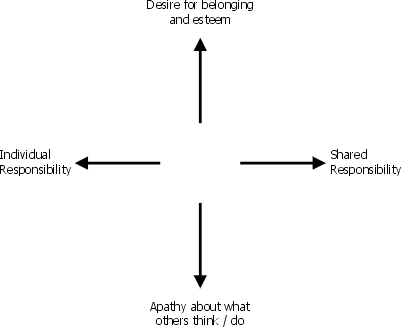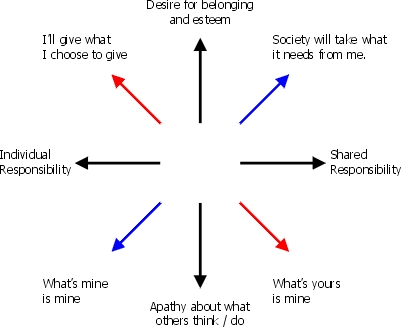A couple of days ago, I posted about Abraham Maslow's Hierarchy of Needs, and how that lens can help to focus on the difference between between Republicans and Democrats. My main point: Liberals give greater weight to Maslow's 3rd and 4th tiers, which are a sense of belonging and esteem from others, and they see this as important to Maslow's 2nd tier, which is Safety and Security.I summed this up as "Safety and Security in (or through) Community." Conservatives, on the other hand, see Maslow's 2nd tier as pre-emptive. First safety and security, then be concerned with a sense of belonging and esteem from others. I regarded this as "Safety and Security - then Community." You can read that post by clicking on the "View Thread" link up above.Thinking it through some more, there are two axes that brace this thinking. 1) Individual Responsibility vs. Shared, or Group, Responsibility. It's "Do It Yourself" vs. "It takes a Village." 2) Apathy about the opinions of others vs. wanting group decisions and a sense of moving ahead together. So I created a simple chart to represent these two arcs.  At times, each of us occupies a position on either axis. We can perch comfortably in any quadrant. There is a time for every position available. I mentioned the other day that acting alone for safety and security first is at times important, and that there are other times when acting in concert with others is best. But neither position is right all of the time. For example, a person could consistently give all of their money to others, and pay the most essential of their bills for themselves. That sounds wonderfully selfless, but it's well-understood that a person who saves their money can earn interest or dividends on the money saved, and thereby actually give more throughout their life because of their sturdy financial position. Safety and security through "selfishness" first - before concern about the opinions of others. There is a time to think first by yourself, and a time to think as a group. If a neighborhood in plagued by a redundant burglar, the people are best served by acting together and watching each other's homes rather than just watching their own. Safety and security through community is stronger for the numbers. After drawing up my little chart, I then went to each quadrant and thought about it. Here's what I got:  True? From this, what makes for the best society?
Where would America sit on this chart?
Where would you sit on this chart in your political and personal values? I'll close this post with something Joseph Tainter said in his book, "The Collapse of Complex Societies." He found that, in studying the collapse of many societies, the return on investment for greater complexity yielded diminishing results. In his conclusion, he said: There are two general factors that combine to make a society vulnerable to collapse.First, stress and perturbation are a constant feature of any complex society. Yet a society experiencing declining returns is investing ever more heavily in a strategy that is yielding proportionately less. Excess productive capacity will at some point be used up, and accumulated surpluses allocated to current major operating needs. There is, then, little or no surplus with which to counter major adversities. Unexpected stress surges must be dealt with out of the current operating budget, often ineffectually, and always to the detriment of the system as a whole. Even if the stress is successfully met, the society is weakened in the process, and made even more vulnerable to the next crisis. Secondly, declining marginal returns make complexity a less attractive problem-solving strategy. Where marginal returns decline, the advantages to complexity become ultimately no greater (for society as a whole) than for less costly social forms. The marginal cost of evolution to a higher level of complexity, or of remaining at the present level, is high compared with the alternative of disintegration. Under such conditions, the option to decompose (that is, to sever the ties that link localized groups to a regional entity) becomes more attractive to certain components of a complex society. Many of the social units that comprise a complex society perceive increased advantage to a strategy of independence, and begin to pursue their own immediate goals rather than the long-term goals of the hierarchy. Behavioral interdependence gives way to behavioral independence, requiring the hierarchy to allocate still more of a shrinking resource base to legitimization and/or control. In short, efforts in constantly increasing the complexity of a society are ultimately doomed to fail, as history shows. Unchecked investment in complexity actually invites the breakdown of society because of the lousy return on ever-escalating cost. Finally, the people get fed up with it. In the past, this was achieved by bloody revolution or by the state's waning power and relevance.The one mechanism though that could change this is: democracy. Thoughts on that will be my next segment in this series. |